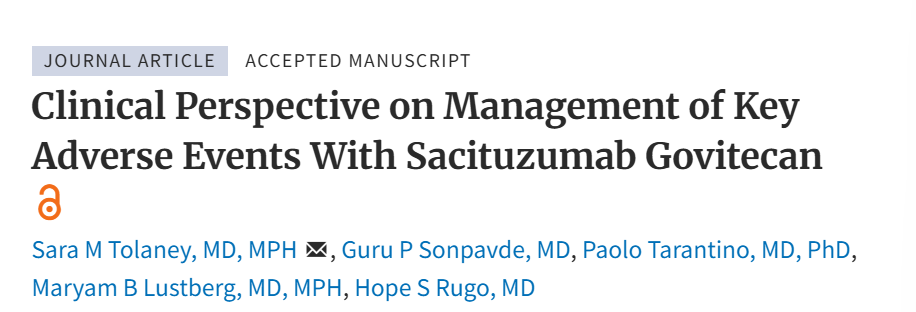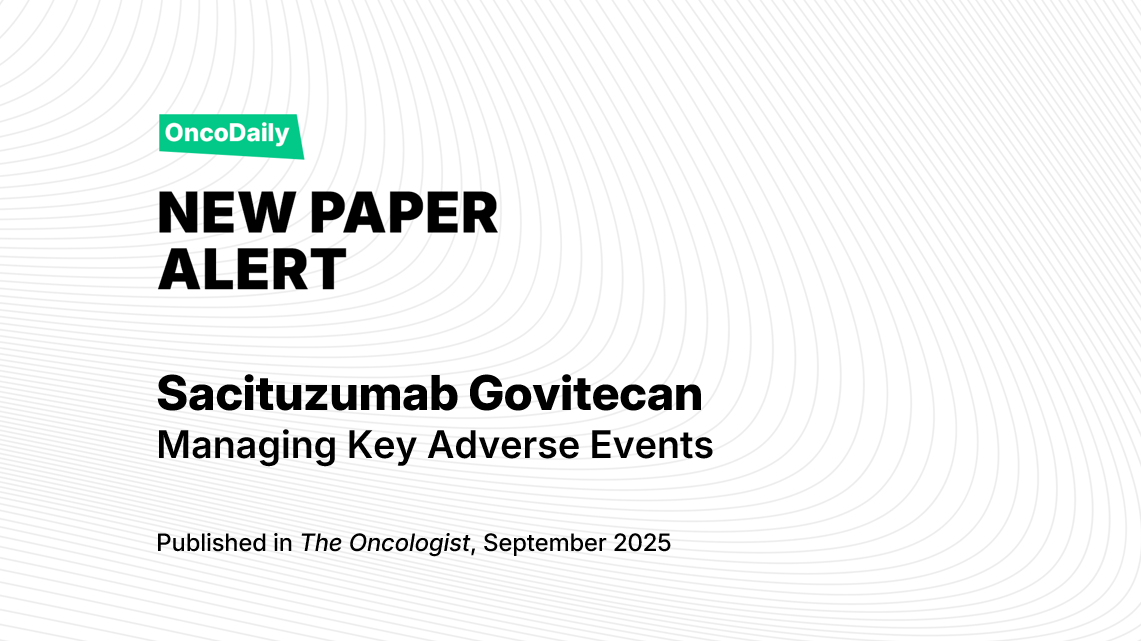Sacituzumab govitecan (SG), a Trop-2–directed antibody-drug conjugate, has emerged as a pivotal therapy for patients with metastatic triple-negative breast cancer (TNBC) and hormone receptor–positive, HER2-negative breast cancer after multiple prior treatments. While clinical trials such as ASCENT and TROPiCS-02 established its efficacy in improving survival, the treatment is associated with predictable but significant adverse events, including neutropenia, diarrhea, fatigue, and alopecia. Understanding how to anticipate, prevent, and manage these toxicities in real-world practice is essential to maximize both safety and clinical benefit. This review integrates evidence from pivotal trials with frontline clinical experience to provide practical guidance for oncologists using SG in daily practice.
Title: Clinical Perspective on Management of Key Adverse Events With Sacituzumab Govitecan
Authors: Sara M Tolaney, Guru P Sonpavde , Paolo Tarantino, Maryam B Lustberg, Hope S Rugo,
Published in The Oncologist, September 2025

Background
Sacituzumab govitecan (SG) is a first-in-class Trop-2–directed antibody-drug conjugate that delivers SN-38, the active metabolite of irinotecan, directly to tumor cells. In the United States, SG is approved for the treatment of unresectable, locally advanced, or metastatic triple-negative breast cancer (TNBC) after at least two prior systemic therapies, and for hormone receptor–positive (HR+), HER2-negative breast cancer after endocrine therapy and multiple prior chemotherapies. Phase 3 trials such as ASCENT and TROPiCS-02 established SG as a standard option, showing superior progression-free and overall survival compared with chemotherapy. However, real-world management of SG-related adverse events is critical to maintain efficacy and patient quality of life.
Methods
The review article synthesized safety outcomes from major clinical trials (IMMU-132-01, ASCENT, TROPiCS-02, TROPHY-U-01) and integrated clinical practice experience from leading oncologists. The focus was on the incidence, timing, and management of four major adverse events: neutropenia, diarrhea, fatigue, and alopecia. Patient cases were included to provide real-world context for treatment strategies.
Study Design
In clinical studies, SG was administered at 10 mg/kg intravenously on days 1 and 8 of a 21-day cycle. Adverse events were prospectively monitored, and management protocols followed established trial guidelines and U.S. prescribing information. Real-world adaptations included proactive monitoring, early prophylaxis, and individualized supportive measures, particularly in patients with risk factors such as advanced age, comorbidities, or UGT1A1 polymorphisms.
Results
Across pooled data, the most common adverse events with SG were:
- Neutropenia: occurred in 61% of patients (grade ≥3 in 46%). Median onset was 2.3 weeks. Febrile neutropenia occurred in 6%. Use of granulocyte-colony stimulating factor (G-CSF) reduced incidence significantly in high-risk patients.
- Diarrhea: reported in 64% (grade ≥3 in 11%), with onset at ~2 weeks. Early recognition and aggressive loperamide use were critical. Atropine prophylaxis was effective for acute cholinergic symptoms.
- Fatigue: affected 51% of patients (grade ≥3 in 7%). Management strategies included lifestyle modifications, evaluation of reversible causes (e.g., anemia, thyroid dysfunction), and SG dose adjustment if persistent.
- Alopecia: observed in 45%, generally within the first 2–3 weeks. Although not life-threatening, alopecia significantly impacted quality of life; counseling, wigs, and scalp cooling (where appropriate) were recommended.
Subgroup analyses highlighted increased risk in patients with UGT1A1*28 homozygosity, associated with higher rates of neutropenia and diarrhea. Despite this, toxicity was manageable with careful monitoring and prophylaxis. Importantly, dose reductions and interruptions remained low across studies (≤6%), ensuring continued clinical benefit.
Key Findings
- Adverse events with SG are common but largely predictable and manageable.
- Neutropenia and diarrhea require the most proactive intervention, often with G-CSF and antidiarrheal prophylaxis.
- UGT1A1 polymorphisms increase risk but do not preclude treatment.
- Efficacy outcomes, including progression-free and overall survival, are maintained even with dose modifications.
Quality of life benefits are preserved when adverse events are effectively managed, supporting long-term SG use in appropriate patients.
Key Takeaway Messages
- Proactive management is essential: Early monitoring, patient education, and prophylaxis are critical for neutropenia and diarrhea.
- Real-world care may differ from trial protocols: Individualized strategies based on comorbidities, age, and genetic predisposition optimize safety.
- Multidisciplinary support improves outcomes: Nurses, pharmacists, and oncologists must work together to ensure adherence and minimize toxicity.
- Patients should be counseled early: Setting expectations for alopecia, fatigue, and gastrointestinal symptoms improves treatment tolerability.
Conclusion
Sacituzumab govitecan has transformed treatment for metastatic TNBC and HR+/HER2- breast cancer, offering meaningful survival gains. Its clinical benefit is maximized when adverse events are anticipated and managed through proactive strategies. Neutropenia, diarrhea, fatigue, and alopecia remain the most frequent toxicities but are reversible and controllable with appropriate interventions. The integration of trial evidence with real-world experience underscores the importance of individualized management, enabling patients to continue therapy and derive maximum benefit.
You can read the full article here.


